Compostable bags, marketed as an eco-friendly alternative to traditional plastic, raise the question: are compostable bags really compostable? Yes, they can be composted, but only in an industrial composting environment. Many consumers and businesses are skeptical, wondering if these bags are just a marketing ploy or another example of greenwashing.
As a manufacturer with 16 years of experience in compostable bags, this article will explore how to safely dispose of compostable bags at home, whether "home compostable" bags actually work, and how commercial composting facilities operate.
“Compostable,” “Biodegradable,” and “Degradable”
"Compostable", "biodegradable" and "degradable" are completely different concepts and are easily misunderstood in the market.
Compostable: This category has relatively strict requirements. Under specific, controlled conditions (such as temperature, humidity, and microbial activity), it must be able to decompose into carbon dioxide, water, non-toxic biomass, and inorganic materials within a specified timeframe (90-180 days). These decomposed materials can be used as compost to improve soil quality. Products must be certified by the professional organization BPI.
Biodegradable: This category is biodegradable. There are no specific requirements for the decomposition environment, which can be soil, oceans, or industrial facilities, with no specific timeframe or end product requirements. Traditional "biodegradable" plastic bags can take decades to decompose in the natural environment, leaving behind microplastics. Microplastics are potentially harmful to animals.
Scientific studies (e.g., by the University of Plymouth and TUV Austria) have shown that:Scientific studies (e.g., by the University of Plymouth and TUV Austria) have shown that:
- Microplastic residue in soil can impact plant growth, soil biodiversity, and water retention.
- PLA- or PBAT-based bags often fragment but do not fully mineralize in home compost.
- A 2020 study found some certified compostable bags still had visible residues after 6 months in backyard compost.
Degradable/Oxo-degradable: Traditional plastics are treated with chemicals that break down into tiny fragments under the influence of sunlight and heat. These fragments are actually microplastics, which can contaminate soil and water, causing long-term damage to ecosystems. Their use has been banned in many countries, including the EU.
| Term | Definition | Decomposition Time | Conditions Required | End Products | Notes |
|---|---|---|---|---|---|
| Compostable | Breaks down into CO₂, water, biomass, and non-toxic materials under controlled conditions. | 90–180 days | High temperature, humidity, specific microbes | Safe compost that enriches soil | Requires certification (e.g., BPI); industrial composting often needed. |
| Biodegradable | Can break down through biological activity in various environments (soil, ocean, landfill, etc.). | Varies (can take years) | No specific conditions | May leave microplastics or other residues | No strict regulation on time or final product. |
| Degradable (Oxo-degradable) | Plastics with additives that break down into fragments under sunlight and heat. | Months to years | Sunlight and heat | Microplastics | Banned in many countries (e.g., EU); causes long-term pollution. |
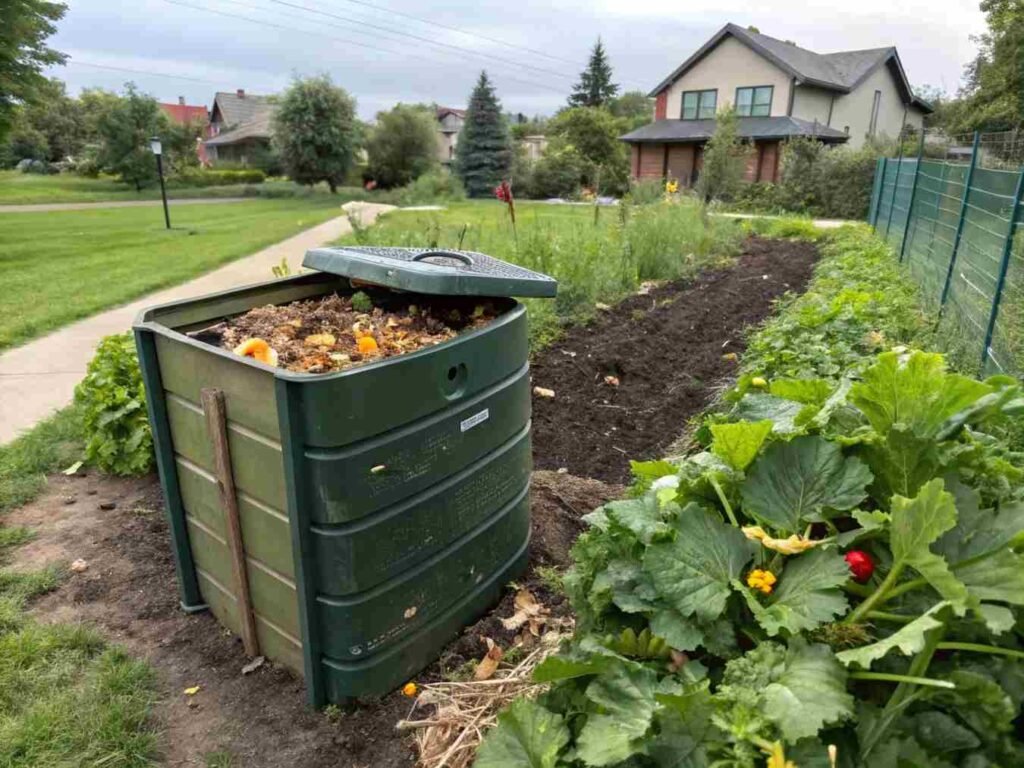
Carbon Footprint & LCA Comparison
| Bag Type | CO2 Emissions (per 1,000 bags) | Renewable Material | Decomposition |
| Conventional Plastic | 1,900 kg | ❌ | Hundreds of years |
| Paper Bags | 1,300 kg | ✅ | 2–4 months (wet conditions) |
| Compostable (PLA/PBAT) | 1,500–2,000 kg | ✅ (partially) | 3–6 months (ideal conditions) |
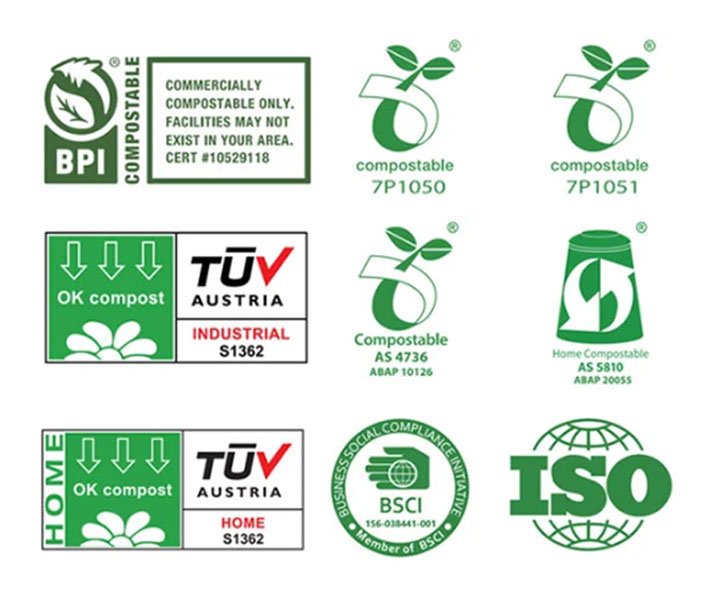
A Trusted "Green Pass"
The most effective way to ensure the compostable bags you buy are genuinely made from the right materials is to look for professional certification marks. These certification bodies undergo rigorous testing to ensure that products meet specific decomposition standards.
BPI (Bioplastics Institute): One of the most reputable certifications in North America. BPI certification requires that products completely decompose within 180 days in an industrial composting facility. This means that bags bearing the BPI mark can safely be placed in municipal food waste collection systems.
TÜV AUSTRIA (OK compost HOME): A certification specifically for home composting. It requires that products decompose at lower, less stable temperatures, such as in a home compost bin. If your community doesn't have industrial composting facilities and you have your own home composting system, bags bearing this mark are your best choice.
Seedling: A certification mark for the European industrial composting standard EN 13432. Similar to the BPI certification standard, it also applies to industrial composting.
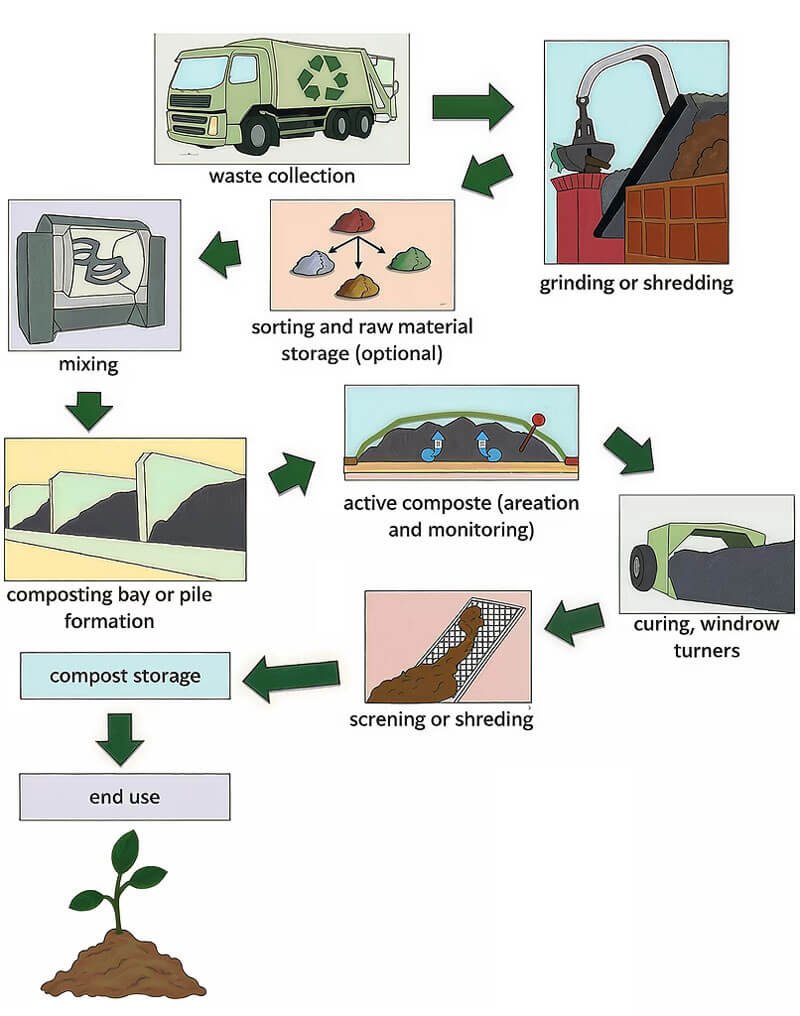
How Compostable Bags Are Composted in Industrial Composting Facilities
1.Pre-processing and Sorting:
The food waste and leaves in compostable bags are collected and first sent to a pre-processing center. Large machines then sort them to remove non-compostable debris, such as glass, metal, and regular plastic bags.
2.Crushing and Grinding:
To accelerate the decomposition process, compostable packaging is shredded into smaller pieces, increasing the surface area available to microorganisms.
3.High-Temperature Composting:
After being crushed, the material is fed into massive composting piles. Industrial facilities use mechanical agitation and precisely controlled temperatures, typically between 55-70°C (131-158°F), while also controlling temperature, humidity, and oxygen levels. These conditions stimulate microbial activity. Bacteria, fungi, and other microorganisms break down the biopolymers (such as corn starch or PLA) in the compostable bags and the food waste into carbon dioxide, water, and biomass.
4.Curing:
After several weeks to months of fermentation, the material enters the curing stage, transforming the mixture into nutrient-rich humus. Ultimately, it becomes nutrient-rich compost, which can be used as a soil conditioner or fertilizer. It is toxin-free, enriches the soil, and completes the circular economy cycle. This compost can be sold to farmers, gardening companies, or used for public landscaping.
The carefully managed conditions in industrial composters allow compostable plastics to break down much faster than in a home composting environment.
Are Compostable Bags Really Compostable in Industrial Composting Equipment
A drawback of industrial composting equipment is that while compostable bags can be discarded, older equipment and simpler processes can cause them to be sorted out along with plastic bags. This prevents compostable bags from being composted, so before using them, be sure to check your city's waste disposal regulations to confirm whether they accept certified compostable bags.
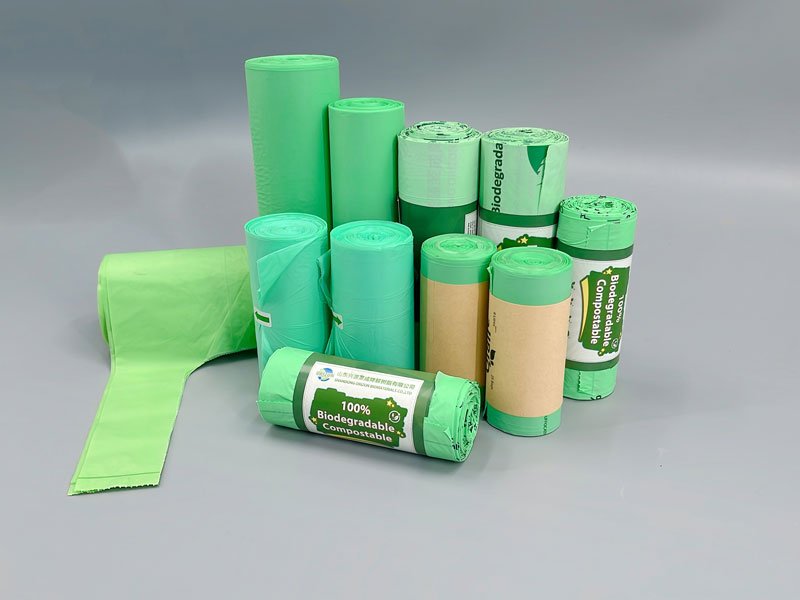
How to Safely Dispose of Compostable Bags at Home
- Why are most compostable bags unsuitable for home composting?
Temperature and microbial activity cannot be controlled in a home environment. Industrially compostable bags require temperatures above 50°C to decompose, which is difficult to achieve at home. This results in the bags breaking down very slowly or not at all, ultimately leaving fragments in the compost.
- Alternatives:
Instead of compostable bags: Use a covered food waste bin and pour your food waste directly into it. Then, regularly empty the bin and clean it thoroughly. While this increases the cleaning burden, it ensures a purer compost.
Use brown paper bags: Paper is inherently compostable, decomposes quickly in a home compost pile, and provides a valuable carbon source.
- What to do with bags that are unsuitable for home composting?
If you have industrially compostable bags but cannot send them to a commercial facility:
- Shredding: Cut the bags into small pieces and place them in the compost bin. This increases the contact area between the bags and the microorganisms, accelerating the decomposition process.
- Deep Burial: Bury small pieces deep in the middle and lower layers of your compost bin, as temperatures there are generally higher than in the surface, which aids decomposition.
- Time: Industrially compostable bags may take several months or even over a year to fully decompose in a home compost pile. When sifting the compost, return any undecomposed pieces to the compost bin.
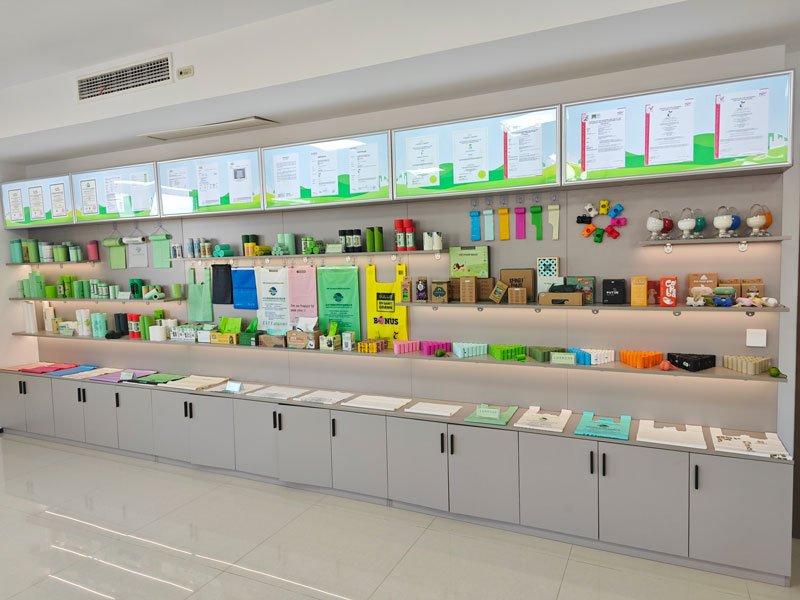
TOP Brand Compost Bag
| Brand | Certification | Home Compost Performance | Material | Notes |
|---|---|---|---|---|
| BioBag | OK Compost HOME, BPI | 90% decomposed in 120 days | PLA + starch | Reliable for home use |
| UNNI | BPI, ASTM D6400 | 50% decomposed in 90 days | PLA + PBAT | Better for industrial compost |
| Green Earth | OK Compost INDUSTRIAL | Fragmented but not fully gone | PBAT blend | Not suitable for home composting |
| If You Care | TUV HOME Compost | Fully decomposed in 60–90 days | Potato starch | Best choice for backyard bins |
How Long Does a Compostable Bag Last?
When discussing compostable bags, focusing solely on their ability to "decompose" isn't enough. A truly eco-friendly product is environmentally friendly throughout its entire lifecycle.
Production Stage: Most compostable bags are made from bio-based materials (such as corn, potato starch, or sugarcane). Does growing these crops take up valuable arable land and consume significant amounts of water and energy? Some studies suggest that, in some cases, the production process of bio-based plastics may have an environmental footprint comparable to, or even higher than, that of conventional plastics.
Transportation Stage: Raw materials originate from overseas, and the carbon emissions associated with their transportation are also a factor to consider.
Disposal Stage: If compostable bags are not composted in industrial composting facilities but instead end up in landfills, decomposing in an oxygen-deficient environment produces methane (a greenhouse gas 25 times more potent than carbon dioxide), which contributes to global warming.
The Added Value of BPI Certification: Some certification bodies are incorporating more comprehensive environmental considerations into their standards. BPI certification now requires products to be free of per- and polyfluoroalkyl substances (PFAS), a class of chemicals widely used in industrial products that are persistent, toxic, and difficult to break down once in the environment. By ensuring compostable bags are PFAS-free, certifiers are helping us avoid new sources of contamination.
Why Are Compostable Bags Expensive?
R&D and Patent Costs: Producing compostable polymers requires significant R&D investment.
Raw Material Costs: Bio-based materials are generally more expensive than petroleum-based plastics.
Certification Costs: Obtaining certifications like BPI and TÜV requires expensive testing and auditing fees.
Is the extra cost worth it? You're contributing your own small part to environmental sustainability by avoiding the use of traditional plastic bags. You're also supporting the development of a growing sustainable product and contributing to the development of industrial composting facilities. This is in line with the government's ban on single-use plastic bags.
Conclusion:
Compostable bags aren't a perfect solution. While truly compostable bio bags require specific conditions, they are undoubtedly a step in the right direction. They aren't products you can just throw away and decompose; we hope they'll be used in a responsible and conscious manner.
Source:
- Wikipedia https://greencitizen.com/





